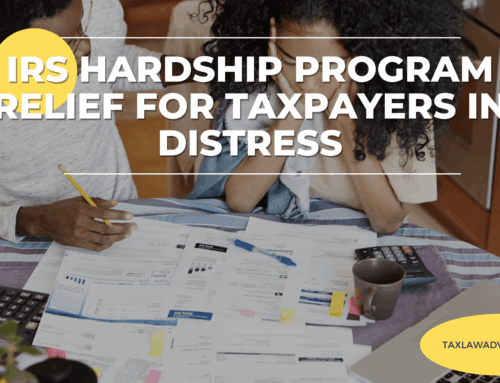Living the expatriate life comes with unique adventures and challenges, and tax planning is undoubtedly one of them. U.S. citizens residing abroad find themselves in the singular position of having to file taxes with the U.S. government, making it crucial to understand the intricacies of tax planning for expats. In this blog, we’ll delve into the distinctive tax challenges faced by U.S. expatriates and explore strategies, with insights from Tax Law Advocates, on how to minimize tax liability while living abroad.
The Challenge: U.S. Taxation Based on Citizenship
Americans living abroad are obligated to file U.S. taxes, which sets the U.S. apart from other countries, as it taxes based on citizenship rather than residence. This unique taxation approach puts expatriates at risk of double taxation—paying taxes both in their country of residence and to the U.S. on the same income.
Strategies for Minimizing Tax Liability with Tax Law Advocates:
1. Foreign Earned Income Exclusion (FEIE):
Foreign Earned Income Exclusion is one of the most powerful tools in an expatriate’s tax arsenal. This provision allows qualifying expats to exclude a substantial portion of their income (approximately $100,000, adjusted annually) from U.S. taxation.
– Qualification: Expatriates can establish eligibility through the Bona Fide Residence Test or the Physical Presence Test, providing proof of permanent residence or spending at least 330 days outside the U.S. in the tax year, respectively.
– Application: Expats can claim the FEIE by filing Form 2555 when submitting their federal return.
2. Foreign Housing Exclusion:
Expatriates earning over the FEIE limit can further reduce their U.S. tax liability by claiming the Foreign Housing Exclusion. This provision allows for excluding a portion of housing expenses from U.S. taxation.
– Application: Similar to the FEIE, expats can claim the Foreign Housing Exclusion by using Form 2555.
3. Foreign Tax Credit with Expert Guidance from Tax Law Advocates:
The Foreign Tax Credit provides a dollar-for-dollar credit for taxes paid abroad. This credit can eliminate U.S. tax liability for expats in countries with higher tax rates than the U.S., and any excess credits can be carried forward.
– Application: Claimed by attaching Form 1116 to the federal return. Tax Law Advocates specialize in maximizing foreign tax credits for expatriates.
4. Utilize Your Foreign Spouse with Tax Law Advocates:
Expats can maximize tax benefits by strategically involving their foreign spouse. Depending on the spouse’s income and tax situation, this can result in increased deductions and exemptions, a strategy often employed with expert advice from Tax Law Advocates.
5. The Streamlined Procedure:
For expatriates behind in their tax or foreign bank account reporting, the Streamlined Procedure offers a penalty-free amnesty program to become tax-compliant. Tax Law Advocates can guide expats through this process efficiently.
6. Renouncing Citizenship:
While a drastic measure, renouncing U.S. citizenship might be a viable option for expats settled abroad permanently, especially high earners facing perpetual U.S. tax obligations. Tax Law Advocates can provide comprehensive advice on the implications and process.
Strategizing for Success with Tax Law Advocates:
Choosing the right strategy depends on various factors, such as income, country of residence, and marital status. To navigate these complexities effectively, consulting with an expert expat tax specialist, like Tax Law Advocates, is crucial. These professionals apply tailored techniques based on an expat’s circumstances, often resulting in significant tax savings.
U.S. Income Tax Obligations While Living Abroad:
As a U.S. citizen or green card holder living abroad, yearly taxes on worldwide income are still mandatory. The U.S. has tax treaties with many countries, allowing for reduced tax rates or exemptions on certain foreign income. Understanding the tax position based on nationality rather than residence is vital.
Foreign Earned Income Exclusion (FEIE) is Not an Excuse for Non-Filing:
A common misconception is that filing a tax return is unnecessary if income falls below the FEIE threshold. On the contrary, claiming the exclusion requires filing a return. Non-filing may lead to losing the exclusion privilege.
Foreign Tax Credits:
Foreign taxes paid can be credited against U.S. tax liability or deducted. Claiming a credit is often more advantageous, as it directly reduces tax liability, with excess credits applicable in subsequent years. Tax Law Advocates can ensure expatriates optimize their foreign tax credits efficiently.
In conclusion, tax planning for expatriates involves a nuanced understanding of tax laws and careful consideration of individual circumstances. By employing the right strategies and seeking professional advice from Tax Law Advocates, U.S. expatriates can navigate the complex tax landscape and minimize their tax liability while enjoying the benefits of international living.
For personalized guidance and expert assistance in your expat tax planning journey, contact Tax Law Advocates at 855-612-7777 or visit our website. Let Tax Law Advocates help you maximize your expatriate experience while optimizing your tax situation.






